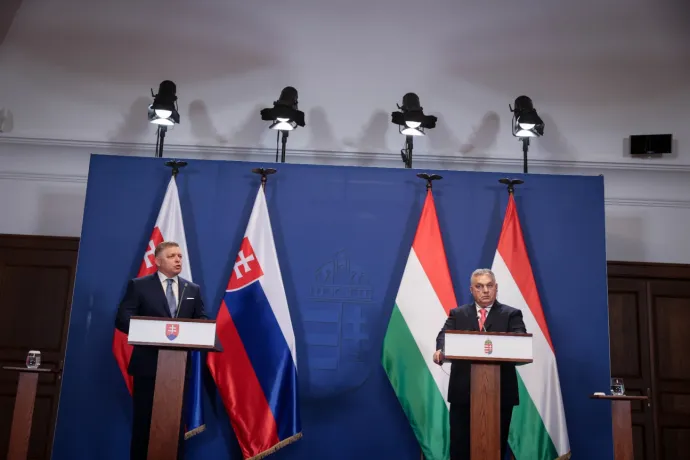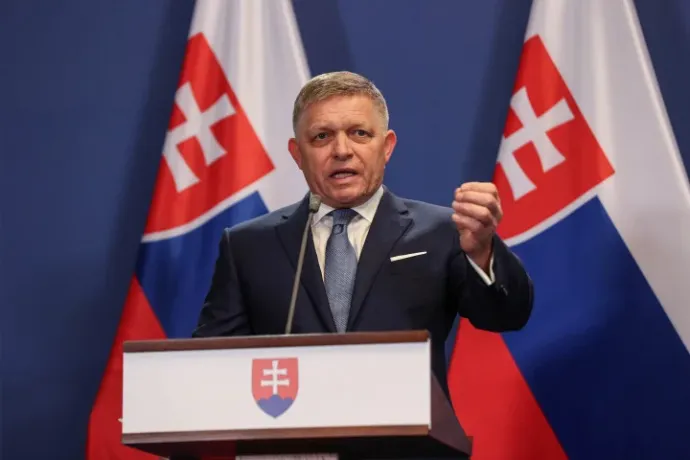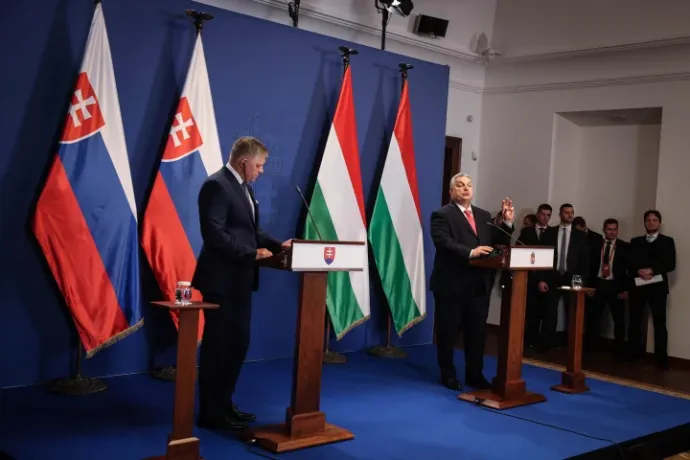Fico in strong agreement with Orbán: sending weapons to Ukraine will not solve anything

There is no military solution to the situation in Ukraine, declared the Slovak Prime Minister, who supports Hungary's proposal that the war-torn country should not receive financial aid from the EU budget. Robert Fico was received by Viktor Orbán at the former Carmelite Monastery, and it was obvious that they strongly agreed on their Brussels-related objections, on the handling of illegal migration and on Hungary fighting to defend its sovereignty in the EU.
"We waited years for this meeting, and we are happy that it has happened", Orbán said at the beginning of a joint press conference with the Slovak Prime Minister, also expressing his views on the previous Slovak governments, after which Smer won the elections last October and was able to form a coalition government again.
Orbán spoke of mutual respect as a given "due to our long shared history" and said that while the two countries' governments come from different political camps – the Social Democratic Smer-SD formally defines itself as a center-left party – both countries "belong to the world of Latin Christianity". This provides a common base on which “a policy of mutual respect can be built.”
The fight for sovereignty
According to Viktor Orbán, the policies of the two governments "point in the same direction 99 percent of the time, with sovereignty being important to both countries, and neither of us being pleased with the Brussels initiatives for a superstate, nor with the efforts to legitimize illegal migration".
Orbán was particularly grateful for the assistance provided by Slovak police officers at Hungary's southern borders. 20,000 illegal migrants from the south have been stopped with their help – which means that many migrants less "perhaps not in Hungary, but in Austria and Germany", the Prime Minister commented.
Neither Orbán nor Fico said anything about the sudden surge of illegal migrants crossing from Hungary into Slovakia prior to the early elections in Slovakia in the autumn, nor about the fact that this phenomenon essentially disappeared overnight after the elections that brought Fico's victory.
Apart from mentioning migration, Orbán mostly focused on issues concerning the relationship between the two countries. Since a quarter of Hungary's electricity import comes from Slovakia, this was one subject he mentioned. He also highlighted trade relations, with trade amounting to €15 billion, making Slovakia Hungary's third most important trading partner. The Hungarian Prime Minister also spoke about the need for joint border crossings, and welcomed the fact that the number of such crossings had risen from the 16 in 2016 to the current 40.
Fico, however, put the relationship in a broader European context: he spent more time criticizing Brussels than Orbán did, and while he criticized the EU, he defended the Hungarian Prime Minister.

He said that Orbán was being stigmatized because he holds a different view than most EU members. Anyone who differs is immediately ostracized, he said. "If we do not stop this process ... then God save the EU as such," Fico said.
The Slovak Prime Minister believes that it would be "the beginning of the end of the EU" if member states' veto rights were taken away and decisions on most issues were taken by majority.
"Dear Viktor, you are very popular among ordinary people in Slovakia because you are fighting for the national interests of your own country," he said, “you staunchly stand up for the sovereignty of your own country.”
– Fico said. “As long as I am the head of the Slovak government, I will never agree with punishing a country for fighting for its national sovereignty.”
He briefly touched on the importance of the V4 and how the 65 million-strong community can do more together in the EU than Hungary, Poland, the Czech Republic and Slovakia could do on their own. But the function of the V4 has been "rendered dysfunctional, made impossible on purpose", he said, without naming those who have made cooperation impossible.
"We will urge the Czech Prime Minister to bring the four countries together as soon as possible" to "address the issues that concern all of us equally," Fico said.
Ukraine is to Moscow like Mexico to Washington
Fico then turned his remarks to Ukraine, showing that Orbán had certainly found a political ally on the subject. He first thanked the Hungarian Air Force for its contribution to the protection of Slovak airspace, because previously "our very successful governments handed everything over to Ukraine, so we don't have any aircraft that can perform this specific task", he said, criticising his predecessors. He then spoke more specifically against the way the EU would support Ukraine.
He described Orbán's fight in the European Council against the budget revision that would give Ukraine €50 billion over the next four years as legitimate. Fico indicated that Slovakia would like to receive more money from the EU for guarding its borders against illegal migration and for dealing with the secondary consequences of the war in Ukraine, but he is opposed to the EU giving money to Ukraine at the cost of member states losing out.
“Can I indeed not express my opinion and say that there is no military solution here? Can I not say that the Ukrainian army is currently unable to successfully wage war against Russia? Can we not say that this war has no antecedent?”
– Fico asked rhetorically. He then repeatedly pointed out that anyone who raises these questions risks being ostracized. Recalling a conversation he had with a US senator, he essentially said that the war was the responsibility of the United States. He argued that Russia feels about Ukraine the same way that the United States would feel if there were pervasive Russian influence in Mexico, and Russia “would drag Mexico into some kind of a war adventure.”
"Let's call a spade a spade! We may pour in 50 billion, we may keep on giving weapons, but that solves nothing!"
– Fico said, adding that "as a Slav, he's also offended" by Slavs destroying and killing each other.
"There could have been a ceasefire twice already", but "the Ukrainian delegation was forbidden to agree to a ceasefire", the Slovak Prime Minister said, without giving any specifics or naming those responsible, suggesting that he believed the West was behind it.
Fico says Ukraine must be helped, but in a different way than before: Slovakia is ready to provide humanitarian aid, but not more weapons, "because weapons will not solve the war". Similarly to the Hungarian government's frequent pro-peace statements, Fico did not talk about how Russia could be persuaded to make peace, nor did he mention that it was Russia that had attacked Ukraine, and that it had not given up on taking more territory either.
Orbán has no ambitions for a European position
In this respect, Orbán was less impassioned than Fico, answering the only two questions from journalists which were allowed: Hungary is not opposed to financial assistance to Ukraine from EU members. In fact, Hungary is ready to provide its share even on a GNI (gross national income) basis, but there are two conditions for this. One, that this should not be done through the EU budget, but that the EU should create a fund for this purpose outside the budget, and the other one is that the EU should not take out a loan for this purpose.

In other respects, which are not related to Ukraine, the government is in favor of reviewing the EU budget. This way, for example, Slovakia's needs could be taken into consideration, which were discussed in the meetings held prior to the press conference, both in private and during the plenary session.
They both mentioned that Hungary is to assume the six-month rotating presidency of the EU Council from July 2024. Fico backed Hungary's programme and rejected suggestions that Hungary should be stripped of this right or that its presidency should be postponed to a later date due to the ongoing disputes with Brussels. "Who are these people coming up with such an idea?" – Fico said again, indignantly.
Orbán said that as Hungary prepares for the presidency, it wants to be "a good mediator of European affairs." "I've done this once before, it's not an unfamiliar landscape. When Hungary chaired the council in 2011, those were no less tumultuous times,
that presidency coincided with the adoption of the Hungarian constitution, which also caused controversy in Brussels."
Finally, on a personal note, he commented on the resignation of the President of the European Council, Charles Michel, which would theoretically automatically make him the interim President of the EU's governing body, if no successor were to be found in time.
"I am happy to take on any task that may arise in Europe, but I would like to make it clear that neither I nor my party have such European ambitions. We are happy to work in Brussels, but such a task is not part of my plans, neither personally nor for my party. We are “happy here at home.”
For more quick, accurate and impartial news from and about Hungary, subscribe to the Telex English newsletter!